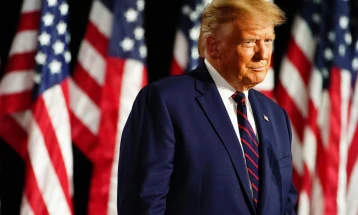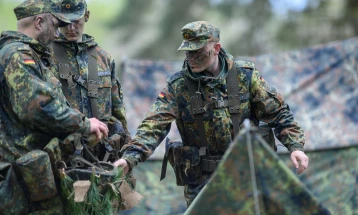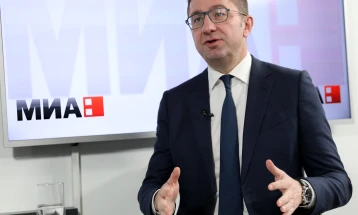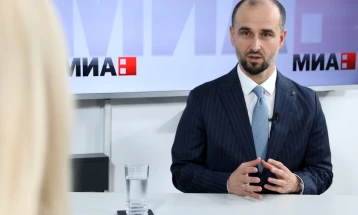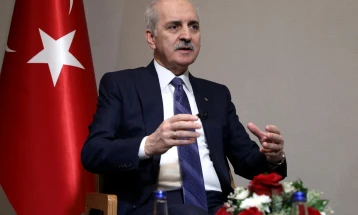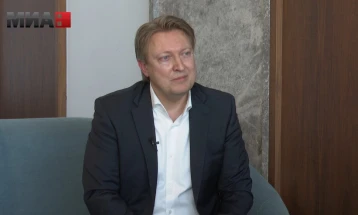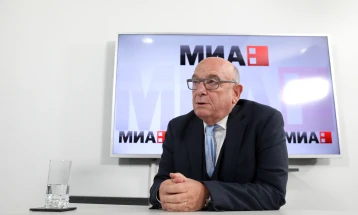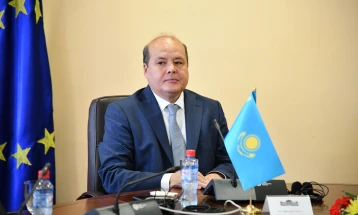With Finland and Sweden's accession, 96 percent of people in EU are protected by NATO, Bauer tells MIA
- With the accession of Finland and Sweden, 96% of the people in the EU are protected by NATO, the Chair of the NATO Military Committee, Rob Bauer, told MIA in an interview.
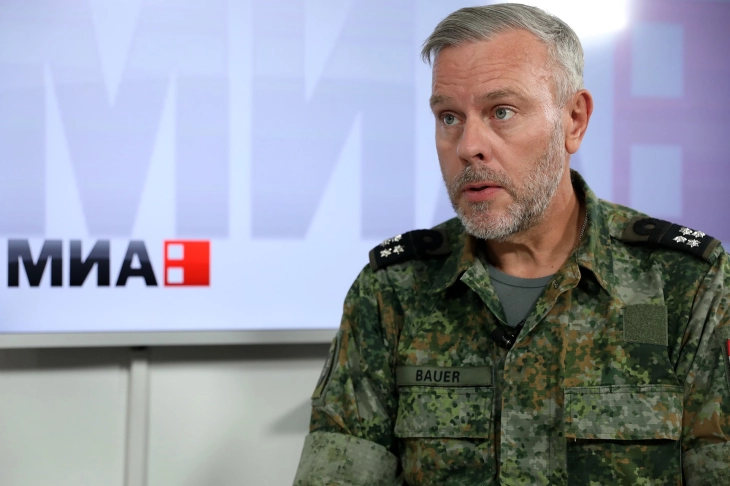
Skopje, 9 September 2023 (MIA) – With the accession of Finland and Sweden, 96% of the people in the EU are protected by NATO, the Chair of the NATO Military Committee, Rob Bauer, told MIA in an interview.
Asked how much EU membership, besides NATO membership, is important for the stability of the region, considering the current geopolitical developments, Bauer noted that it is not a prerequisite to be a member of both organizations and that NATO’s focus is on the physical security of nations, adding that more and more nations of the EU are also members of the Alliance, and that some of the nations that are only members of NATO are striving to also become members of the EU.
“NATO is not the guarantor of everything, so in that sense there is still a number of things where NATO is not primarily looking at. We are looking at the physical security of nations. That is what the Alliance is about, the defense of the Alliance. So, I think there is a number of nations in the Alliance that are members of both NATO and the EU, and there is also a number of nations that are only members of NATO. And therefore, it is not a prerequisite to have both, to be member of both organizations. We see, with for example the accession of Finland and Sweden, that more and more nations of the EU are also members of the Alliance, and that some of the nations that are only members of NATO are striving to also become a member of EU. And that is primarily a political discussion amongst nations within the EU primarily, to allow other nations to join. So, it’s a political discussion I will not become a part of. But it is good to understand for example, and that’s an interesting fact, that with the accession of Finland and Sweden, 96% of the people in the EU are protected by NATO,” said Bauer.
The Chair of the NATO Military Committee, who visited North Macedonia at the beginning of the week, spoke to MIA about the messages he sent at the meetings with high state and military officials over the process of harmonization with the NATO standards, which he said doesn’t end with membership, instead it’s constant and dynamic.
“You constantly adapt your armed forces based on the development of the threat, that is what you must do, and this always takes time because there are different ways of operating, you might need different equipment and capabilities. For example, the enormous number of drones that is now being used in a war like in Ukraine is a huge change,” stressed Bauer.

Providing an assessment of the country’s armed forces, Bauer said North Macedonia has made great strides in the past three years.
“North Macedonia was a partner for 25 years already, so the step from being a long-standing partner operating with us, for example in Afghanistan, has helped greatly in preparing your nation for NATO. But of course, one you are a member, it becomes even more important to be interoperable and to work in accordance with the agreements that we have amongst each other. I think that North Macedonia has made great progress in the last three years. We see that because North Macedonia takes part in three battle groups in Latvia, Romania and Bulgaria, we see North Macedonia increasingly in the mission in Kosovo (KFOR), we see North Macedonia in Iraq, so there are a lot of missions and operations in which North Macedonia is operating as a NATO member and is fully aligned with the rest of NATO,” said Bauer.
The head of the NATO Military Committee also spoke about defence spending in line with the decision made at the summit in Vilnius, the modernization of the armies, cyber security, propaganda and disinformation, as well as about the situation in Ukraine
Below is the full interview with the Chair of the NATO Military Committee, Rob Bauer:

Admiral Bauer, you are visiting North Macedonia, you held several meetings with top state and military officials, what was your main message?
The main message was the last summit in Vilnius, where leaders of 31 nations came together, made very important decisions on the budget and the minimum of two percent, on regional plans, which is basically military plans to explain which capabilities we need, how many people we need, what we need to be able do against the two threats – Russia and the terrorist groups, what kind of command and control we need, the capabilities we need. These were all decisions that were made but on paper. The next phase is extremely important, which is to make sure that together we make sure these plans are executable, that we are, in a couple of years, really able to do what we have agreed in these plans, i.e. to counter those two threats in all aspects, in all regions, with the required people, the required capabilities, the required stocks and all things that are necessary.

North Macedonia is already a NATO member, but the process of harmonization with NATO standards is not fully completed. What is your take on that process, where has the country made progress, and where does it need to do more work?
It is important that people understand that standardization and interoperability are things that are never finished. Why? Because, for example, we learned lessons from the war in Ukraine that we will have to change certain things and the way we do it, because of what we see happening in Ukraine. Not all the things, but certain things that apply basically to NATO if we would have a conflict with Russia. So, you constantly adapt your armed forces based on the development of the threat, that is what you must do, and this always takes time because there are different ways of operating, you might need different equipment and capabilities. For example, the enormous number of drones that is now being used in a war like in Ukraine is a huge change. That means something on how we operate but also the threat to us, if there are a lot of drones against us, how do you counter those threats, how do you operate when you have a lot of drones in your air force. It is a constant battle with also the technological changes, the changes on how the enemy or adversary operates, and therefore it’s a continuous process. North Macedonia has made great strides, because in the last three years we have seen great progress in the armed forces. North Macedonia was a partner for 25 years already, so the step from being a long-standing partner operating with us, for example in Afghanistan, has helped greatly in preparing your nation for NATO. But of course, one you are a member, it becomes even more important to be interoperable and to work in accordance with the agreements that we have amongst each other. I think that North Macedonia has made great progress in the last three years. We see that because North Macedonia takes part in three battle groups in Latvia, Romania and Bulgaria, we see North Macedonia increasingly in the mission in Kosovo (KFOR), we see North Macedonia in Iraq, so there are a lot of missions and operations in which North Macedonia is operating as a NATO member and is fully aligned with the rest of NATO.

The modernization of the Army is one of the priorities of the country’s authorities. Instead of the recommended 20 percent of the budget, North Macedonia already allocates over 30 percent for this purpose. What is your opinion on the course of the modernization process of the forces?
It might be necessary, as is the case now in North Macedonia, to spend more because there is a lot of new equipment required: things for the armed forces on the ground, things for helicopters, for transport of people, infrastructure. So there is a lot of investment and a lot of nations that require investments. I think it’s a trend to see in NATO at the moment, because of the fact we have not invested enough for so long, that a lot of investments are necessary to renew equipment, to make sure that we remain up to speed with all technological changes and with the requirements that are connected to these regional plans that I talked about.

At the Vilnius summit, NATO members agreed to commit a minimum of 2% of their GDP to defence spending. The country plans to meet the 2% target next year. Currently, it allocates 1.85% of its GDP for defence. These are funds from the budget, which flow to NATO, how much is the investment worthwhile and what do Macedonian citizens get in return?
That’s something that I very often hear and it’s a misunderstanding that money flows to NATO. Actually, it’s an investment in your own forces and in your own security. Therefore, it is not money that we get in Brussels headquarters and are going to spend on things there, no. Only a very limited amount of money goes actually into what we call common funding. Last year, that was 0.25% of all the budgets together spend by the nations, of all 31 nations. It’s a very small amount of everything that is spent. The majority of the money is spent in your own nation, to improve your armed forces, to become ready, to become more able to actually perform all the tasks that are necessary. So, it is not money that goes to NATO. It is money that goes to North Macedonia’s security. And yes, for many, many years, nations did not spend enough money on their security and their defense, and that is the change that is happening now. There’s a number of nations that say – actually we need more than 2%, but the consensus, the agreement has been minimum of 2%, which is a big change from what was agreed in Wales in 2014, where the nations agreed we are going towards 2%. This year, 11 nations are spending 2% or more, so there is still a lot of nations that have to pass that point of 2%. But, the information that I have on the projections for 2024, there will be an increase in that number next year. So, I think we will see that we’ll increase the number of nations that will pass the 2%, primarily not because of this figure, but because it is necessary to improve the defense of our nations.

NATO is a guarantor of stability, respect for existing borders, sovereignty and territorial integrity of states. However, the ideas of greater states do not seem to leave the region, they are also expressed by high-ranking public office holders. How much do you consider such public appearances to be a real threat for the stability of the Western Balkans?
Even if it is only rhetoric, I don’t think it is wise because it makes people nervous, and in itself it produces instability because people get nervous and people are becoming insecure because they hear all these different stories. What is important for our Alliance is that we support a number of things. One is the idea of sovereignty, the idea of internationally recognized borders, the idea that a nation is responsible and able to think about its own future and its own destiny, and of course the rule of law. Those are the four things that are crucial in our Alliance when it comes to how we deal with each other, and I think that is amongst the members the way we talk to each other and solve issues. Because it is also within our Alliance that there can be arguments, there can be disputes maybe even, but that is the reason why we are still able to solve all these things because we adhere to those four very important rules and values. If other nations are not doing that, and we are involved in those nations through operations for example, outside of our area of responsibility, then of course it is up to the nations where we are to basically assist and help in restoring that stability. First and foremost, it is not up to anyone else than the nations themselves primarily to solve these issues and to make sure that they live in peace, together. Because that is in the interest most of the time of the citizens in those nations.
NATO membership is seen as a guarantee of stability, but how much is EU membership also important in that package, both for North Macedonia and for the Western Balkans region, and what do you think staying outside the EU would mean in the current geopolitical circumstances?
NATO is not the guarantor of everything, so in that sense there is still a number of things where NATO is not primarily looking at. We are looking at the physical security of nations. That is what the Alliance is about, the defense of the Alliance. So, I think there is a number of nations in the Alliance that are members of both NATO and the EU, and there is also a number of nations that are only members of NATO. And therefore, it is not a prerequisite to have both, to be member of both organizations. We see, with for example the accession of Finland and Sweden, that more and more nations of the EU are also members of the Alliance, and that some of the nations that are only members of NATO are striving to also become a member of EU. And that is primarily a political discussion amongst nations within the EU primarily, to allow other nations to join. So, it’s a political discussion I will not become a part of. But it is good to understand for example, and that’s an interesting fact, that with the accession of Finland and Sweden, 96% of the people in the EU are protected by NATO.

How much is North Macedonia the target of cyber attacks, propaganda, fake news?
I am not necessarily the right person to ask this question to because I am not Macedonian. What we see is that if a nation is attacked, for example with cyber, then it is up to the nation if they inform NATO about it. We have agreed in NATO, but it is possible that cyber-attacks can lead to an Article 5 situation where an attack on one is an attack on all. So that is an interesting policy decision that has been made, but at the same time the same thing goes for a physical incursion in your nation. Nations will report to NATO that it happened, and then NATO will respond. It starts with the nations themselves, and in our treaty you have Article 5 that most of the people know which is 'An attack on one is an attack on all' but we also have Article 3 which states that, first and foremost, ‘Every nation is responsible for its own defense.’ But, if you are attacked, the rest will come to help. In this case, in regard to cyber, it is up to the nation whether they want help or not, and in a number of cases already NATO has sent experts to North Macedonia to help and assess the situation. That at the moment is what NATO does on request of N. Macedonia or other nations. But, we see that in general, misinformation, disinformation and cyber-attacks are increasingly part of the type of attacks that the nation, any nation, can be under. The Alliance itself experiences cyber-attacks, regularly, it is other nations that regularly experience cyber-attacks, which is something of great concern and the main thing I think NATO is able to do is to help North Macedonia with expertise and how to become less vulnerable to those attacks.

There’s fear that the war in Ukraine could become a frozen conflict. On Ukraine's Independence Day, August 24, you posted a tweet honoring the courage shown by the Ukrainian military leadership, adding that Ukraine is on the path to victory. What is the reason for this optimism?
I think there is a lot of news where people talk negatively about the offensive, that is not going fast enough, or as well as everybody expected, but people have to understand that it is extremely dangerous and difficult. We are talking about minefields of 10km and more, and five to six mines on every square meter. That is the challenge the Ukrainians were looking at. Because of for example the enormous amount of drones used by the Russians, they have a good view of the battlefield along the front, and when the Ukrainians were using armored vehicles or mine-clearing vehicles, the Russians were able to destroy them. So, the Ukrainians have had to choose a different tactic and that is basically crawling forwards, clearing mines, moving forwards in this extremely dangerous and difficult area. They have gained ground every day 300 meters, not back and forth, 300 meters forward. That is a 300 meters loss for the Russians. So my saying that they are losing to the Russians, means that you are losing 300 meters every day. There is no gains for the Russians, it is the Ukrainians that have the gains slowly, maybe slower than they want, but it is extremely dangerous and difficult. The only thing we must do is to support them, continue to support them, and not necessarily talk them down because I think there is not a lot of people that understand better how difficult and dangerous it is than Ukrainians themselves.

You have said “in this time of political power shifts and increasingly complex security threats, I firmly believe that the strength of the North Atlantic Alliance lies in its cohesion“. On the other hand, French President Emmanuel Macron recently called for bolstering the technological autonomy and the security independence of Europe. How much is this concept giving backing to the NATO cohesion you seek?
I don't think necessarily that one excludes the other, I don't think that me mentioning unity is contrary to what President Macron is saying when he says that Europeans should have more autonomy in the industrial technological field. The reason for that is from a political point of view is that the industry in Europe must grow as well, because the defense production capacity in the Alliance and western world as a whole is not big enough at the moment. In Europe and the USA we need more defense industry, more production capacity to produce all the ammunition and weapon systems that we need. And it is not something will only happen in the next two years, but it will happen in the next 5-10, even more years to come. I think this is a call from – I'm not a French politician – but the way I interpret it is that the French President says to the EU 'do more on his industrial front to become better' and I believe that that does not exclude unity within the Alliance because what I am talking about is unity in the way we talk about the values in how we respond to something like an invasion in Ukraine by the Russians. That unity was probably a surprise for a lot of people, that the unity within the Alliance, it certainly was a surprise for Mr. Putin, and the unity within the EU, and then the unity between NATO and EU, which allowed for very fast decisions on the sanctions, on our responses to the invasion. I think it is not necessarily two things that are contradictory, but two things that can coexist.
Ana Cvetkovska
Photo: Darko Popov
Video and editing: Andrej Brankovikj, Aslan Visko
